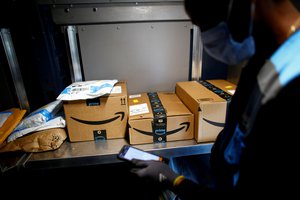Last week, Goldman Sachs predicted that unemployment in the United States will hit a shocking 25 percent by the end of the year. That’s the rate it was at the height of the Great Depression. Even right now, the number of unemployed Americans is nearly equal to the entire population of Canada, with more than 36.5 million jobless claims filed in the past two months alone.
Around the world, countless businesses are being decimated by emergency orders related to COVID-19, including many companies in the tech sector — yet some of that industry’s biggest players are actually benefiting. People are shopping on Amazon and meeting via video conference. Kids are going to school online and using social platforms more than ever. Many financial analysts predicted that a recession would curb the growth — and the soaring stock processes — of the tech sector. But the industry seems to be remarkably resistant to recession. This has meant that while small businesses struggle to stay afloat, Big Tech’s market cap is only getting bigger. Together, Apple, Amazon, Microsoft, Alphabet and Facebook now account for one-fifth of the Standard and Poor’s 500 Index.
To explore the implication of this market concentration, this week on Big Tech we spoke to Joseph Stiglitz, a Nobel laureate economist and a professor at Columbia University. In the interview, he touches on the unique moment that America finds itself in. Failing in its response to the pandemic — the United States is now the global epicentre of the outbreak — and though once a reliable global governance leader, America is now the albatross around the necks of the very institutions (such as the World Health Organization and the World Trade Organization) that (however imperfect) are needed to assist in the collective action needed to respond what is fundamentally a global crisis. It is clear this wild reversal has affected Stiglitz. And it is a shocking place to find ourselves.
Nonetheless, we have, at least in part, been here before. The Great Depression saw a similar consolidation of industrial America. Small companies disappeared and large companies further dominated the market. However, these surviving companies had large blue-collar workforces. Today, Netflix employs fewer than 5,000 people. If we are betting our economic recovery on the market cap increase of a handful of tech companies that don’t actually employ that many people, we may be solidifying the digital economy’s structural problems — the very ones that need to be remedied.
Just as the Great Depression ushered in a period of US trust-busting, a COVID-19-related recession or depression may well see renewed pushback against the size and scope of US tech firms. A couple of months ago, I think you could still argue that Amazon wasn’t necessarily a monopoly power. But that argument is becoming increasingly difficult to make. As Kara Swisher, co-founder of Recode, has noted, “There will be a culling of most competitors of these giants that will only strengthen the power and reach of the behemoths, eliminating pesky roadblocks to their further domination. This is obviously not a good thing in the long run.”
The Great Depression was a time not only of massive economic inequality and economic concentration, but also of significant consolidation of political power. Stiglitz points out that it was this combination of economic and political influence that led to the antitrust movement. These companies were seen as too big and, perhaps more importantly, as too powerful, and therefore as anti-democratic. Such a combination of economic and political concentrations of power is surely the same today.
Yes, Big Tech is undeniably getting bigger, both in economic size and political power. At the same time, the United States is moving closer to filing antitrust suits against Google, many are renewing calls for stricter acquisition restrictions on deals such as Facebook’s purchase of Giphy, and Amazon continues to flaunt regulators with its control of a massive digital market in which it also sells products. Ironically, it could just be that the growth Big Tech is experiencing as a result of our pandemic-forced digital lives may be the final straw that triggers serious antitrust policy.



